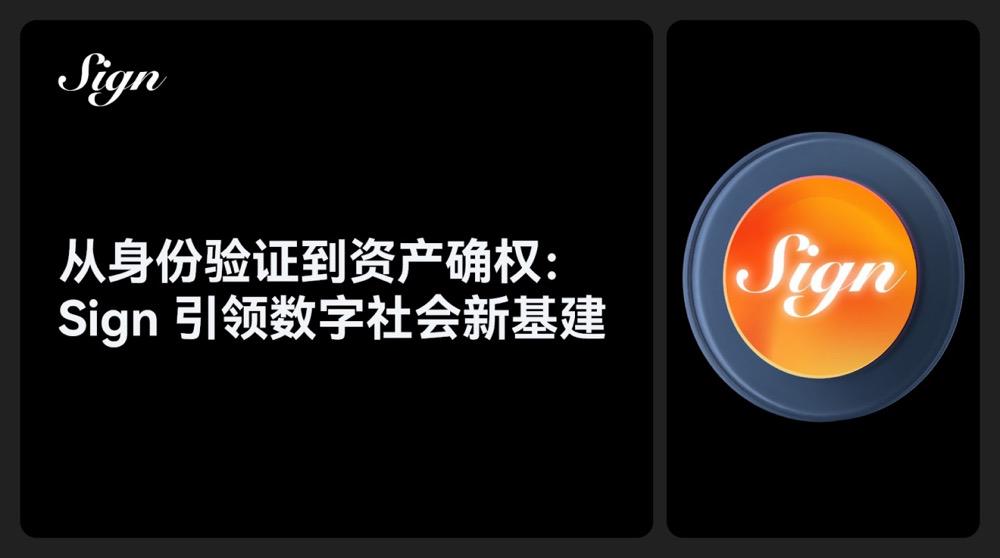
在数字浪潮的加速冲击下,全球的运作方式几乎每天都在被重新定义。那么,如何在各主权国家内部独立运作的身份系统、资产分配及监管规则之间,建立一套全球通用的标准,以突破数据孤岛割裂、标准不统一、合规成本高等带来的,成了全球协作的一道“玻璃天花板”?。
要想打破这层天花板,我们需要的是一套能被主权国家、跨国企业、乃至纯 Web3 社区共同接受的信任底座。Sign 正是在做这件事:
主权级身份:通过 Sign Protocol,把护照、签证等官方凭证安全地搬上链,帮助政府在合规框架内释放数字政务潜能。
TokenTable 标准:把复杂的代币发行、解锁、分发流程模块化、模板化,让企业和项目方像调用 API 一样发布通证,同时保证监管可追溯。
简而言之,Sign 希望通过统一的标准,将“需要在全球范围内轻松可验证的需求场景”搬到区块链上,从身份验证到资产确权,让个人、企业和政府都能享受全球协作的便利。
项目概览:Sign 要解决什么问题?
项目概述
SIGN 当前正参与建设多个国家级数字基础设施,产品已实际部署于阿联酋、泰国与塞拉利昂,计划覆盖二十余个国家与地区,包括巴巴多斯、新加坡等新兴数字政务实践高地。
在产品指标上,Sign Protocol 凭证模板数量已实现数量级增长,TokenTable 平台累计分发总额突破 40 亿美元,覆盖超过 4000万 个链上钱包地址,实际服务项目超 200 个,涵盖包括 Starknet、ZetaChain、Notcoin 在内的多个主流生态。
资本市场对其认可正在逐步兑现。红杉资本跨区域参与投资,YZi Labs 亦于后续轮次领投,Sign 项目已实现 1500 万美元年营收,成为身份与通证基础设施赛道中为数不多的具备实际收入模型的参与者,展现出强大的市场竞争力和发展潜力。
项目愿景
在全球协作不断演进的当下,Sign 提出“超主权数据库”理念,试图通过区块链技术打造全球范围内可验证、可审计的信息结构体系,推动链上治理、链上经济与链上身份的全面融合,成为全球性数字协作的底层引擎。
核心定位
Sign 的核心架构集中于身份验证基础设施与资产分发基础设施两大关键模块。以此为基础,Sign 正在构建一个标准化、可编程、可跨链部署的信任层协议。这一协议能够满足 Web3 的基本需求,并拥有与现实世界高度兼容的身份与分发系统,为实现全球范围内的信任与价值传递提供可靠保障。
技术解构:Sign 的底层架构与产品矩阵
基于 Sign Protocol 及其衍生产品(TokenTable、SignPass、EthSign),Sign 打通链上身份、服务、资产三大引擎,引领下一代数字社会基础设施建设。
Sign Protocol:全链可用的认证协议
Sign Protocol 具备卓越的高度扩展性与灵活部署能力。系统支持多链部署,并可根据监管合规需求进行主权链本地部署,同时借助 Arweave 实现数据的链外冗余备份,确保数据的安全性和持久性。索引层由 SignScan 提供统一管理能力,支持链上凭证的标准化查询与验证,大大提升了操作的便捷性和效率。
该协议支持本地合约交互机制与远程部署架构,并能够接入 Web2 与 Web3 多种身份源。通过采用非对称加密与零知识证明机制,Sign 在提供强大的身份验证能力的同时,也确保了用户隐私的完整保护,让用户在享受便捷服务的同时无需担心个人信息泄露。
TokenTable:数字资产分发引擎
TokenTable 是目前行业内功能最全面的数字资产分发引擎。Unlocker 模块提供完全链上的可信代币解锁方案,适用于线性释放、事件触发等复杂解锁逻辑。Merkle 分发器采用混合式设计,在节省Gas成本的同时保留分发逻辑的灵活性。签名分发器则侧重于中心化高效率分发场景,适配需要社交交互与复杂行为激励的活动需求。
SignPass:链上身份系统
SignPass 面向政府与组织推出高度可配置的链上身份系统,能够有力支撑其在数字政务、资源配置与用户认证等众多场景下的高效应用。通过 SignPass,用户身份可以在不同协议与平台之间轻松复用,成为参与链上治理与各种活动的权威凭证,大大提升了用户在数字世界中的活动便利性和身份认同感。
EthSign:链上签约第一应用
EthSign 作为 Sign 生态的早期产品,经过不断发展,已成为链上电子签约的代表应用。所有合约签署记录永久存储于链上,这确保了合同内容在法律与技术层面上的不可篡改性,为链上商务活动提供了坚实可靠的基础保障。无论是企业之间的合作还是个人与机构的交易,EthSign 都能确保签约过程的安全、透明和可信。
经济模型:SIGN代币信息
SIGN 作为基于 ERC-20 标准的代币,是 Sign 协议的核心激励机制与功能通证。当前最大供应量设定为 100 亿枚,首发流通比例为 12%,其中可流通交易部分约为 8.5%。这一机制在确保初期市场稳定的同时,也为长期治理激励留出了充足空间,并为生态建设提供了坚实基础。
SIGN 代币的角色贯穿于生态使用的各个层面。在协议使用与部署层面,SIGN 被用作计算资源燃料。在社区维度,代币具备抵押与治理能力,可参与产品参数设定与协议演进提案。此外,SIGN 亦承载价值共识功能,为持有者提供参与生态长期方向决策的渠道。
资本与社区:从“顶级投资”到“文化共识体”
自成立以来,Sign 项目凭借其卓越的创新性和巨大的发展潜力,已成功获得 3200 万美元的融资。早期由红杉资本横跨美洲、亚洲多地联合投资,为项目的启动和发展提供了强大资金支持。
后续轮次中,YZi Labs 主导支持,进一步推动了项目的扩张和升级。这种资本结构不仅覆盖了全球主要市场,也充分反映出 Sign 在产业认知、合规布局与业务落地方面的全球化潜力,为其未来的发展奠定了坚实基础。
Sign 生态围绕 Orange Dynasty 打造了具备文化认同感的全球 builder 社群。在链上治理方面,SignPass 作为链上身份载体,被引入 DAO 参与体系,使社区成员可凭身份凭证参与提案与投票决策,形成以签署、社交、验证与分发为核心交互结构的链上身份社交网络。这一机制正在推动“用户-协议-资产”的新型链上关系形态。
未来展望:从“协议”到“数字文明”
Sign 计划在 2025 年开启一系列具有战略意义的产品迭代。Sign将在更多国家推进政府级部署,推动区块链技术在主权机构场景中的广泛应用,进一步提升其在政务领域的影响力。
下半年,Sign 计划聚焦于移动端生态整合,旨在打通身份、任务与分发模块,构建一个便捷的用户参与与流动性入口,吸引更多用户加入 Sign 生态。年底阶段,Sign Media Network 将正式上线,标志着 Sign 从基础协议向内容分发网络的成功转型,延伸其在数据主权与链上出版领域的能力,为数字内容的创作和传播提供新的平台和机遇。
中长期战略
面向中期,Sign 将推出 Sovereign Layer2 解决方案,作为政府侧定制化 Rollup 服务形态。通过链上身份与通证系统的深度融合,Sign 正在描绘“链上国家”的原型构想。与此同时,“Sign Stack”公共设施栈也将持续推出,为开发者提供标准化调用接口与开发环境,推动 Web3 应用生态进一步成熟。
构建信任基石:Sign 引领数字文明新纪元
Sign 并不只是一个技术协议或单一平台,而是在建立一个面向未来的信任与协作体系。在身份合规成为全球共识的关键阶段,其基础设施能力正在成为数字社会的关键支撑。
凭借其跨链兼容架构、隐私保护技术与真实落地案例,Sign 展示了 Web3 如何走出圈层,迈向国家级应用场景的可行路径。一个更可信、更透明、更可验证的数字文明,或许正由此开启。而 Sign 将在这场变革中扮演着不可或缺的重要角色,引领我们走向一个充满机遇和可能性的未来。
免责声明:本文章仅代表作者个人观点,不代表本平台的立场和观点。本文章仅供信息分享,不构成对任何人的任何投资建议。用户与作者之间的任何争议,与本平台无关。如网页中刊载的文章或图片涉及侵权,请提供相关的权利证明和身份证明发送邮件到support@aicoin.com,本平台相关工作人员将会进行核查。



